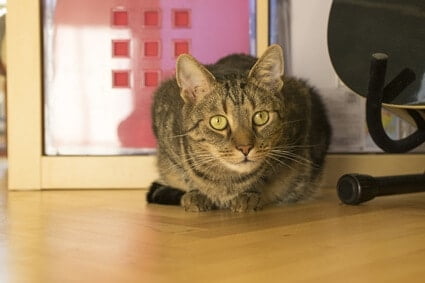Cats have good hearing. They use their ears to hunt and remain alert to any potential threats. Conversely, loud noises will lead to a fear response in cats, so prolonged exposure to sound and loud noises must be minimized.
Cats prefer quiet because it enables them to sleep and relax. Prolonged exposure to noise levels above 95 decibels can cause hearing damage. A short, sharp noise of 120 decibels can put your cat at risk of hearing damage.
Exposure to constant noise must be controlled. According to Physiology & Behavior, excessive noise raises a cat’s blood pressure (hypertension). This is because your cat is living in a heightened state of stress.
Are Cats Sensitive to Noise?
Cats’ superb hearing means that they are sensitive to noise. How sensitive will depend on the cat’s upbringing and anxiety levels. If you have a nervous cat, it will likely be frightened by any sudden noises.
Did the cat live in a quiet home in a peaceful part of the country? If so, living with young children in a loud, highly-populated city will be a huge shock, and it’ll take time for your cat to adjust.
How Loud is Too Loud for Cats?
The table below defines the average decibel level of different sounds:
| Bird song | 40 decibels |
| Human Conversation | 60 decibels |
| Car Engine | 70 decibels |
| Average TV or Radio | 75 decibels |
| Vacuum Cleaner | 80 decibels |
| Shouted Human Conversation | 90 decibels |
| Average Music Stereo | 95 decibels |
| Car Horn | 110 decibels |
| Loud Power Tools | 110 decibels |
| Emergency Services Siren | 120 decibels |
To manage the risk of permanent damage to your cat’s hearing:
- Keep your cat indoors and soundproof the home
- Use headphones when watching television or listening to music at loud volumes
- Minimize exposure to vacuums and similar noisy appliances
- Ensure that your cat has a quiet space to escape to
Get a vet to check your cat’s hearing at least once a year.
Do Cats Prefer Quiet?
Given a choice, cats will always choose a quiet location because:
- Cats hunt by sound, which is easier to do in silence
- Ambushing is unlikely when a cat can hear everything
- It’s easier for cats to sleep without noisy distractions
Making minimal noise is inadvisable as cats like routine and structure. The quieter the environment, the more likely a nervous reaction to sound becomes.
Can Cats Sleep Through Noise?
Cats doze in a noisy environment, but this is not their main sleep. Most cats catch up on deep sleep during the day when a house is empty.
When a cat dozes, it is not actively sleeping. You may be aware that cats have a third eyelid. This helps a cat to doze while remaining aware of its surroundings. The same applies to its hearing.
A cat in a noisy environment is still alert. It leaves one ear open, listening out for danger. In this situation, a cat will block out familiar sounds. It won’t be concerned about the dishwasher, human conversation, or television. In the event of sudden loud noise, it’ll leap to attention.
Ensure that your cat has at least one private space. This gives it somewhere to escape to when overstimulated or it wants to sleep properly.
Sounds That Make Cats Happy
There are some noises that cats actively enjoy, such as:
- Shaking and rattling
- Clicking and scratching
- Other cats
- Opening and closing doors
- An owner’s voice
- Birds chirping
The sound of a door opening or closing will pique a cat’s interest. It will wonder if a favorite person has returned. Speak to your cat as felines recognize humans by their voice, not by sight or appearance.

Why Do Cats Like Shaking and Rattling Noises?
Cats associate these sounds with dinner time. A cat will notice the sounds of the following at dinnertime:
- Shaking a bag of kibble
- Pouring kibble into a bowl
- Placing the bowl on the ground
The same may apply to an electric tin opener. If your cat understands this sound, it’ll become excited.
Why Do Cats Like Clicking and Scratching Noises?
There are two possible explanations:
- The cat underwent clicker training
- Your cat may associate clicking sounds with a treat, such as Temptations
It’s more likely that these sounds stimulate a cat’s hunting instincts, so an excited cat will click its tongue. You will hear this when a cat watches birds through a closed window.
If a cat hears a clicking sound, it will suspect that prey is nearby. Scratching will garner a similar response as cats use their good hearing to locate prey. The scratching sound of a scampering mouse is exciting to a cat.
What Noises Do Not Cats Like?
Four forms of sound provoke fear and anxiety in cats:
- Loud, sudden noises
- Loud, droning noises
- Danger sounds of any volume
- High-pitched, tinny sounds
You may not be able to control exposure to all of these noises.
Cats Hate Loud Noises
Loud noises irritate cats the most. In addition to being frightening, they can cause hearing damage. These sounds fall into two categories – short, sharp shocks, and prolonged droning. Examples of short, loud noises could include:
- Fireworks
- Backfiring cars
- Motorcycles revving
- Car horns
- Slammed doors
- Televised explosions
Most cats jump and flee to safety upon hearing these sounds. Such noise is sometimes unavoidable, such as July 4th fireworks. Prolonged loud noises are just as harmful. These include:
- Vacuuming
- Power tools
- Building work outside/inside the house
- Shouting and loud conversation
If extensive building work is taking place in/near your property, temporarily re-home your cat. Drills and power tools will cause stress. It risks permanent hearing loss and heart problems.
A loud environment can be much harder to manage. Living close to a kindergarten will be noisy at certain times of the day. Your cat will eventually adjust to this background noise.
Vacuuming is the main issue that owners face as cats hate the sound of the vacuum. It’s loud, takes time to be completed, and it invades the private territory of cats.
Cats Hate High-Pitched Sounds
There are some noises that only cats can hear. These will most often be high-pitched sounds.
The peak of human hearing is 20,000 hertz. Even then, most humans aged over 20 cannot hear such high-pitched sounds. Cats can hear sounds as high as 64,000 hertz. A cat can locate prey from up to 50 meters away.
This is why cats stare at walls as they can hear rodents and insects within. Cats can also hear ultrasonic devices, such as car remotes. Even an LED lightbulb may emit sounds that your cat can hear.
A cat’s hearing deteriorates with age. While it is young, a cat’s hearing will be at its sharpest.

Cat Danger Sounds
Cats live in a state of constant awareness. At the suggestion of danger, most cats will flee the area. The sound that most cats associate with danger is hissing. Noises that are like hissing sounds to a cat include:
- Scrunching a plastic bag
- Spraying an aerosol can
- Boiling a kettle
- Repressuring a boiler
Your cat may hiss back or assert dominance over its territory when it hears these sounds. Fleeing is more likely.
Do Cats Like Music?
Owners often find that music attracts cats. Classical music is believed to appeal to felines, but this isn’t the case. According to Applied Animal Behavior Science, Cats enjoy music, but only when the music is intended for them.
Scientists put this theory into practice while creating cat-specific music. The tempo and metronomes were designed to appeal to feline senses. Also, purring and feeding sound effects were applied. The results were surprising. The cats rubbed themselves against the speakers. This was an attempt at claiming the music as their own.
Do Cats Like White Noise?
Some cats draw comfort from white noise because they like routine. An electrical appliance that steadily releases white noise may be comforting to a cat. It can block out unwelcome background sounds. If you have an anxious cat or noisy house, consider getting a white noise machine.
Felines prefer to live in a quiet and peaceful environment that’s free from shouting, building work, loud appliances, fireworks, and thunder. Cats can tolerate some noise, but not when it happens suddenly. Equally, certain sounds, such as hissing, are associated with confrontation and physical danger. Your cat will flee sounds that make it uncomfortable.


What about rumbling base low or mid high frequencies? Do these affect a cats ears or well being, especially from through walls where my neighbor emits this 24 hours a day.